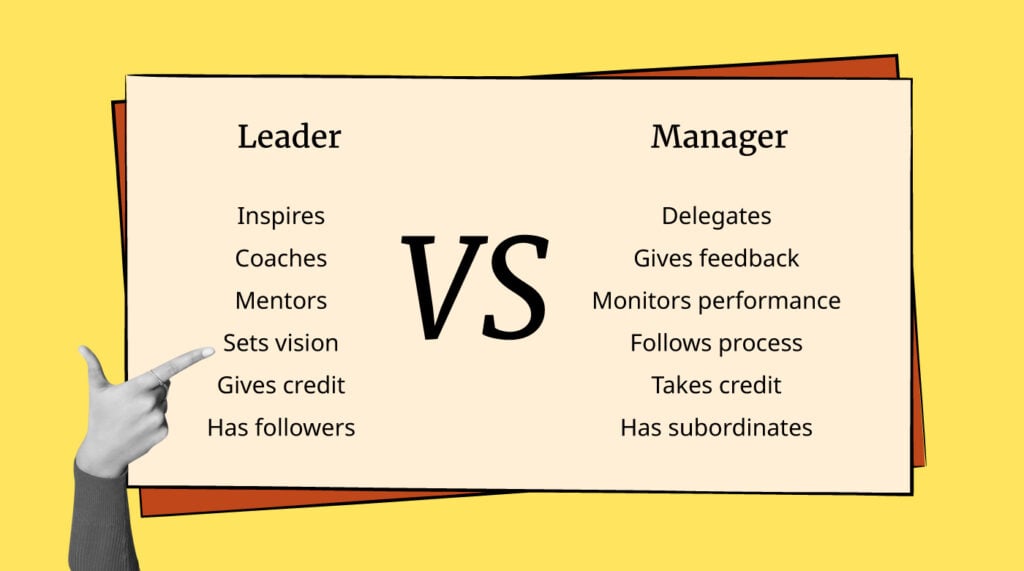Something we get asked a lot from managers, particularly new ones, is the difference between leadership and management.
Valid question, and one exploring in some depth. Having said that, there’s beauty in simplicity, so I’ll try to give a simple answer:
Management is giving people instructions about what to do, how to do it, and when to do it. Leadership is inspiring others towards action.
Those with the skillset to both manage and lead people play a vital role in inching organizations towards competitive advantage.
So, with that in mind, let’s explore the two concepts in a bit more detail.
What is management?
“Y'all got a lot of empathy for managers. Shout out to the managers out there!” — Anthony Clay
At its core, management is about controlling a group of things or people to reach a certain goal. Think of a shepherd and their trusty dog herding sheep about the fields.
As such, managers play a crucial role in any organization. They’re the organizers, tasked with ensuring the right people are in the right place, with the right resources, to achieve organizational goals.
It’s the manager’s job to take the vision and initiatives laid down by the organization’s leaders and turn it into a reality.
It’s a tough gig and, as Liz Lockhard puts it in her excellent people management article, “A bad manager can ruin a good job, but a good manager can make a bad job tolerable.”
So what makes a good manager?
Well, first up, honing core management skills such as project management, forecasting, budgeting, delegation, goal setting, giving feedback, performance management, problem solving, clear communication, and active listening.
Beyond that, great managers take time to interact with their team members, understand their desires and motivations, and adapt their management style to best support their development.
That, in fact, is when managers start to become leaders, which brings us nicely onto our next section.
Related Reads: How To Write SMART Goals (With Examples)
What is leadership?
“You don’t need a title to be a leader” — Unkown
Expanding on the earlier definition, leadership is the ability to inspire and influence others toward a certain goal. In general, leaders are free thinkers who seek to change the status quo.
Anyone can be a leader in an organization, regardless of their job title. A leader is someone who inspires others to work towards a common goal.
Gandhi, Martin Luther King Jr., Millicent Fawcett, and other such activists are perhaps the ultimate examples of great leaders because people didn’t follow them for money or status, they followed them because of their passion, vision, and actions.
You probably already have an inkling of who the real leaders are in your organization. The people who get listened to, regularly asked for advice, and who keep people’s chins up when the going’s tough.
They inspire people through their actions, the way they communicate, and by working with, and in the service of those, around them. They act as coaches, guides, and mentors to get the best out of people and practice trust and empathy when dealing with difficult situations.
One of our podcast guests (highly suggest) Ian Mills, wrote a book called The Leader’s Secret Code that delves into what sets great leaders apart from the rest.
One simple phrase that stood out to him was “Be interested, not interesting”, meaning that true leaders realize it’s not about them, it’s about understanding others and getting the best out of them.
So, with that in mind, some leadership qualities to focus on:
One tip is to find a leader you admire, choose what you admire about them, and go about learning that skill. Even better, reach out to them directly on LinkedIn or wherever and ask for their wisdom. Odds are they’ll happily share it with you!
Related Read: Ready For 2023? Here Are 3 Tips To Help You Stand Out As A Leader
Leadership vs management

From manager to leader
A lot of articles you’ll read on this topic talk about leadership vs management and, while semi-useful for listing a set of qualities no one is 100 percent sure about, it also misses the point.
Truth is the management of people is nearly impossible without some form of leadership.
We’re not computers, we all have the agency to decide whether we want to do something or not.
Developing your managers into leaders will help you manage employee buy-in more broadly and maintain employee engagement. As the old saying goes: "people don't leave the company, they leave managers."
A manager with zero leadership skills isn’t a liked manager and their teams will generally underperform. Relationships with team members will be transactional, and there’s only so much people are willing to give.
In contrast, leaders account for employees in the decision-making process. In fact, the servant leadership style puts employees above customers and shareholders.
Ultimately, organizational goals will be more closely aligned with those whose job it is to reach them and, with that, the increased likelihood of organizational success.
Some leadership development resources to help you on your journey:
- Leadership Development Programs: What Are They And Why Do You Need One?
- In Too Deep: How To Keep Calm & Carry On When You’re Overwhelmed As A New Manager
- Best leadership development programs
- Servant leadership examples and characteristics
- 14 leadership books for new leaders
- The secret code to leadership with Ian Mills
- People Management Tips For New And Experienced Managers
- Four Leadership Lessons From The Early Days Of Abebooks
- Lead With Your Values
- What Is Succession Planning? How To Develop Your Next Leaders
- How To Own Your Emotion And Lead With Vulnerability

